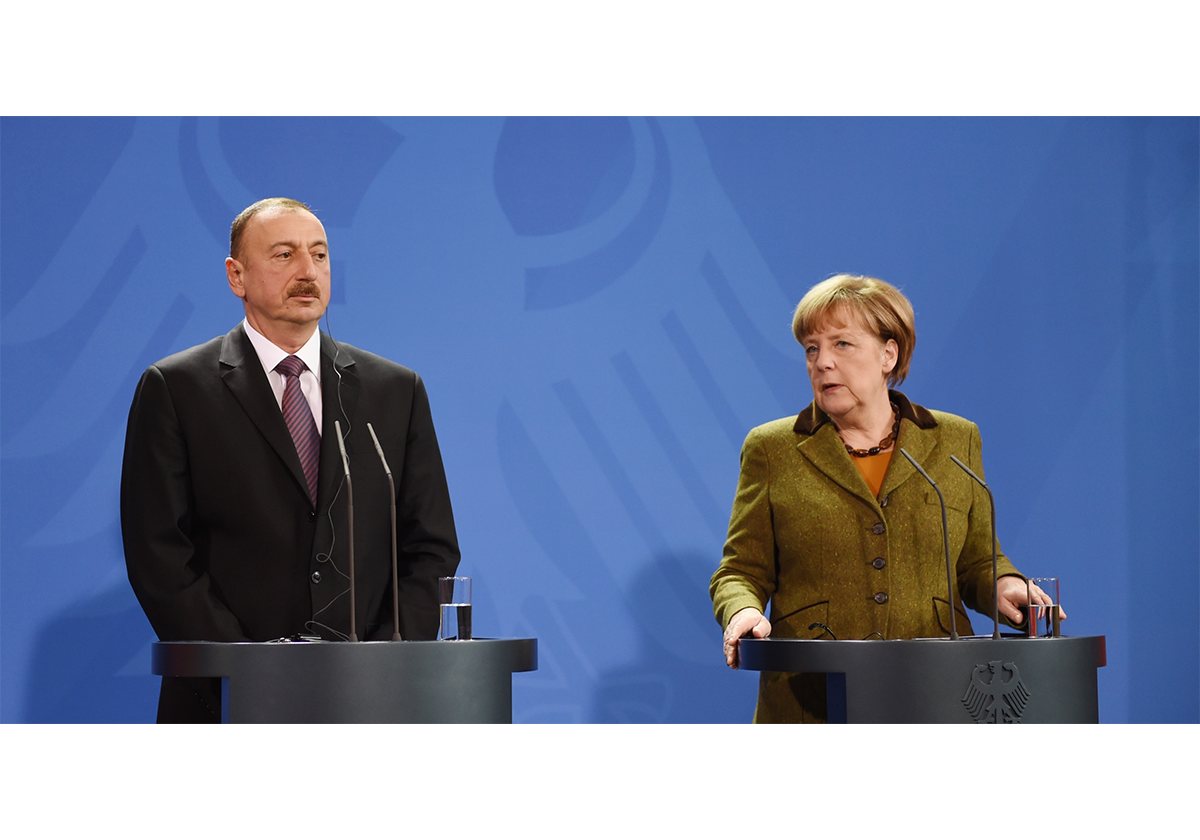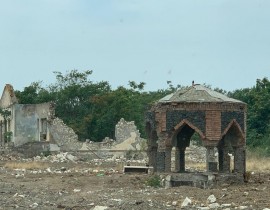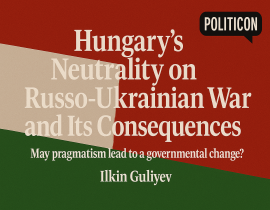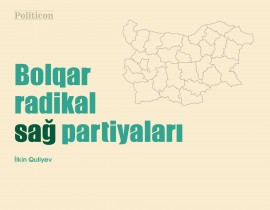Politicon.co
Merkel’s Caucasus trip: Diplomatic show or serious strategic undertaking

German Chancellor Angela Merkel paid state visits to the three Caucasus republics from 23 August to 25 August, 2018. After a period of relative strength that led to the impression of a steady rise of the Federal Republic within the international system, this tour takes place in times when Berlin faces new strategic constraints. These constraints severed over recent years and include serious issues that will likely hinder the country’s ability to push for strategic initiatives that are not directly related to vital interests.
The chaos of the refugee crisis in 2015 not only led to political pressure on Merkel’s government in the domestic realm but consequentially deteriorated Germany’s diplomatic stance within the European Union where the country managed to become the most dominant player over the last decade. At the same time, growing Russian assertions on “Moscow’s European flank” since the annexation of the Crimea in 2014 had a lasting effect on Berlin’s relationship with Russia and have become a constant reminder for Germany’s allies – especially its Eastern European ones – that the country lacks reliable military capabilities, despite its immense economic power. On top of that, the Trump administration continues to confront its traditional ally over trade disputes and alleged German free-riding on U.S. alliance commitments, leading to uncertainty in what has historically been one of Berlin’s most reliable partnerships.
Under such circumstances the question should be raised whether the chancellor’s visit is really an embodiment of a growing strategic involvement in the Caucasus or rather a diplomatic show to bolster Germany’s image as a global actor.
The prospects of Western integration: Long known rhetoric but little potential
Tbilisi was the first destination on Merkel’s trip. Her stay in Georgia was a call to mind that members of liberal Western alliances, like the EU and NATO, also have to submit to realist rationale. Being in close contact with the Bush administration, the country seemed to have a real opportunity for gaining NATO membership status before the Russo-Georgian War in 2008. Even then Germany and France were cautious and opposed the idea of a near-term accession of Tbilisi. Berlin’s stance on the matter only hardened after Russia made apparent by its use of military force that it will not tolerate a NATO enlargement. Merkel made this clear when she declared to her host that a short term accession of Georgia is “not a thing that Germany will promote”. This unusual use of decisive language by a chancellor who is known for hedging and diplomatic caution shows that Germany is not the least interested in challenging Russia in what Moscow has made clear to be a red line 10 years ago.
If everything, Merkel looked disenchanted with the strategic options Berlin has in the region and stated that Russia’s actions follow a pattern in the post-Soviet space that made “life hard” for the former Soviet Republics. Even though Merkel called Moscow out on occupying Georgian territory in Abkhazia and South Ossetia in a show of solidarity with the Georgian cause, the chancellor also said that until today no progress has been made towards achieving a viable agreement, in a way admitting the limited reach of German diplomacy in South Caucasus. No future course of action was put forth either.
Along that line, Merkel also curbed Georgia’s hopes for joining the EU in the near future, declaring that despite the progresses made by Tbilisi she “shall not make any promises that cannot be kept“. Even more telling was her admission of constraints when she said that the EU members also have to make sure that the Union itself is ready for new member states. Germany from the founding of the EU onwards came to be known as one of its biggest promoters and the main beneficiary of the Union’s single market. The growing pessimism in Berlin regarding limits of the EU, arguably the country’s main strategic instrument, is a clear indicator of the current leadership crisis the Union faces. Therefore, the German administration appears to be happy to entrench with the EU-Georgia Association Agreement and its affiliated free trade policies in place.
The relationship with Armenia is in a similar place. Meeting the first time with the new Pashinyan-government which emerged from the country’s so-called “Velvet Revolution”, some observers might proclaim newly emerging opportunities for a Western orientation of the small Caucasus republic. Yet, Erevan’s dependence on its Russian patron is simply too strong and even if it would like to, there are serious doubts if the new government would actually be able to change its strategic orientation. So far, Pashinyan’s statements indicate awareness of this very fact. For Armenia, the visit still provides a good opportunity to further intensify its already growing trade relations with Germany and lobby for further financial aid from the EU.
To the German government on the other side, this was little more than a visit of diplomatic courtesy. Any initiatives beyond the EU-Armenia Comprehensive and Enhanced Partnership Agreement will have to come at the cost of reversing Armenia’s integration with the free trade zone of the Russia-led Eurasian Economic Union. This will not be tolerated by Russia- not even talking about any military involvement of a Western state to break Moscow’s monopoly as Armenia’s security provider. If the German leadership does not show any real desire to push for a Western integration of Georgia, it is not even thinking about taking a risk when it comes to Armenia, where a considerably more restrictive strategic environment makes a positive outcome for Berlin highly unlikely.
So, regarding Georgia and Armenia, it seems that Merkel’s visits have been primarily aimed at bolstering Germany’s image on the international stage. All the rhetoric aside, the country’s interests here are not vital enough to justify a more substantial involvement in the future that most certainly would provoke a Russian counter reaction.
Azerbaijan: Energy supplies as a vital interest
When Merkel visited Baku on 25 August, the picture changed. The main goal of the visit was clear to most observers. Germany itself does not only possess little conventional fossil energy reserves but its ecological movement is a potent political force in German politics. Combining its usual leverage with the public worries right after the Fukushima incident in 2011, the movement was able to push the German government to promptly pass a legislation that will end the generation of nuclear energy until 2022. In addition to that, the ecological lobby was able to achieve a general ban on hydraulic fracturing (fracking) until at least 2021, taking away a possible option besides renewable energy sources to mitigate the effect a tightening energy market could have on the economy. Simultaneously, the campaigning against coal subsidies continues and will intensify because the resource constantly loses competiveness against other energy sources. So, Germany is forced to import large amounts of hydrocarbons, with the biggest share of natural gas coming from Russia (around 40% of its gas imports).
Being dependent on Russian gas supplies, the country is on the lookout for opportunities to diversify its suppliers. Azerbaijan constitutes one of the most promising alternatives to Russia and at the moment, the project of the Southern Gas Corridor, which would transport natural gas from Azerbaijan to the European markets, is steadily progressing towards its realization. A close partnership with Azerbaijan would therefore be a valuable asset for Berlin in order to alleviate some of the country’s current strategic vulnerabilities and the Aliyev government is fully aware of its leverage.
The fact that Baku insisted on banning Albert Weiler, one of Merkel’s delegation members on her Caucasus trip, from entering Azerbaijan because of his prior visits to the Nagorno-Karabakh region, shows that Baku’s has far more leeway than Georgia and Armenia. The cold attitude of the Azerbaijani president made clear that he did not intend to court the chancellor, like her other two hosts, but expects to be approached on equal terms. In line with this, Aliyev showed himself to be disinterested when asked about the possibility of Turkmenistan’s connection to the Southern Gas Corridor. The message was clear; if Berlin expects Azerbaijan to work out terms with Turkmenistan, Germany will have to offer something that is of interest to Baku and to respect the country’s sovereignty over its domestic issues.
This has to be seen in the context of the frequent criticism from European countries on human rights abuses in Azerbaijan and repression against opposition groups. Merkel herself repeated this pattern when she critically talked about the situation. Yet, she was considerably less direct in comparison to the most other cases, when she admitted to be in “disagreement” with her host on these issues. The likelihood that this “disagreement” will lead to consequences which would have a serious negative impact on the German-Azerbaijani relationship, is small, considering Baku has to offer real strategic value for Germany that comes increasingly under pressure.
In contrast to the territorial conflicts in Georgia, Merkel seemed more optimistic when it came to the Nagorno-Karabakh conflict. She even proposed a German participation in the Minsk Group. Analysts see this activism as a clear embodiment of German energy interests, because a conflict in the region constitutes a risk to the pipelines connecting Azerbaijani gas field to Europe. This is underlined by the fact that she did not bring this up in public when she was present in Armenia a day earlier. All of this is going to become a point of friction with Russia, something the German government is not willing to risk when it comes to its relationship with the other two Caucasus states.
Overall, it is fair to say that its energy interests are vital and will therefore drive Germany to further engage with Baku in an attempt to establish a serious strategic partnership, while Georgia and Armenia will likely remain marginal issues for Berlin, especially under the developing constraints Germany faces.
References:
1. Fried, N. (2018) "Merkels Grenzerfahrungen im Kaukasus", Süddeutsche Zeitung, 24 avqust 2018, https://www.sueddeutsche.de/politik/bundeskanzlerin-merkels-grenzerfahrungen-im-kaukasus-1.4103371
2. Schult, C. (2018) "Auf heikler Mission in Baku", Speigel, 25 avqust 2018, http://www.spiegel.de/politik/ausland/aserbaidschan-merkels-heikler-besuch-beim-autokraten-aliyev-a-1224915.html
3. "Angela Merkel in the South Caucasus: Results", Caucasus Watch, 27 avqust 2018, http://caucasuswatch.de/news/976.html
About the author:
Philip Roehrs-Weist is an independent researcher. He holds a bachelor's degree in political science from the University of Goettingen and a master's degree in Middle East, Caucasus and Central Asian security studies from the University of St Andrews. His thematic main interests include militant non-state actors and traditional great power competition with a geographical focus on the Greater Middle East.
![]()
- TOPICS :
- Foreign policy
- REGIONS :
- Russia and CIS


png-1748065971.png)





jpg-1599133320.jpg)

